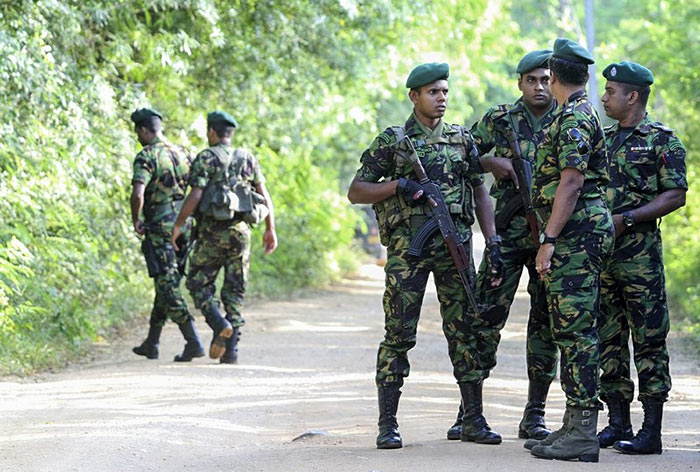Muslim voters attacked as Sri Lanka elects president

Muslim voters traveling by bus to polling stations in northern Sri Lanka were attacked by gunfire and stones and blocked by burning tires hours before polls opened in presidential elections Saturday, in what a member of the Elections Commission called a coordinated effort to disenfranchise the minority group.
There were no reported injuries and police were investigating, said Manjula Gajanayake, spokesman for the Colombo-based Centre for Monitoring Election Violence.
Campaigning for Sri Lanka’s seventh presidential election was dominated by worries over national security in the backdrop of the deadly Islamic State-inspired suicide bomb attacks on Easter Sunday that killed 269 people. At the same time, there’s fear among both Tamils and Muslims about a return to power of front-runner Gotabaya Rajapaksa, a hard-line former defense official under his brother, ex-President Mahinda Rajapaksa.
The Rajapaksa brothers are revered by Sri Lanka’s Sinhalese Buddhist majority for defeating the Tamil Tiger rebels in 2009. Because of their heavy-handed rule during and after the war, some minorities fear their return.
“There is a concerted effort to keep the Muslims away from the ballot box,” Ratnajeevan Hoole, a member of the Elections Commission, told The Associated Press while heading to northwest Sri Lanka to speak with the Muslim voters who came under attack.
It wasn’t immediately clear whether any of the attackers had been arrested.
Hoole said he had called for the arrest of a former top Tamil rebel commander in the east now in alliance with Rajapaksa for making inflammatory comments against Muslims in the run-up to the election, but his request was not heeded.
The ex-rebel commander Vinayagamoorthy Muralitharan broke away from the Tamil Tigers in 2004 and worked with the government to defeat the rebel group. His split helped the government end a 26-year separatist insurgency.
Hoole said that in videos posted on social media, Vinayagamoorthi Muralitharan — also known as Karuna Amman — had talked about the need to suppress the Muslim vote to undermine Muslims’ growing influence in Sri Lanka’s Eastern province.
Rajapaksa had been widely expected to triumph over the ruling party candidate, Housing Minister Sajith Premadasa. But as the election approached, the race became very close.
Premadasa’s supporters organized the convoy of Muslims who had fled their homes in the northern district of Mannar in 1982, when the Tamil insurgency began to grow. A large number of Muslims also were evicted from the north in 1990.
The Elections Commission had encouraged them to register as voters in Mannar but had not arranged enough transportation to bring them from their homes in the northwestern district of Puttalam, Gajanayake, from the election monitoring group, said.
Nearly 16 million of the 22 million people were eligible to vote and choose a new president from a record 35 candidates. President Maithripala Sirisena, who was elected in 2015, is not seeking reelection. Results are expected as early as Sunday.
A decade of peace following nearly 30 years of civil war was shattered earlier this year when homegrown militants pledging loyalty to the Islamic State group detonated suicide bombs at three churches and three hotels on April 21. Rajapaksa, 71, cast himself as the only candidate capable of protecting Sri Lankans from such attacks.
He is accused of persecuting critics and overseeing what were called “white van squads” that whisked away journalists, activists and Tamil civilians suspected of links to the Tamil Tigers rebel group. Some were tortured and released, while others simply disappeared. The Rajapaksa brothers are also accused of condoning rape and extrajudicial killings and deliberately targeting civilians and hospitals during the war.
At a Buddhist temple serving as a polling station in a suburb of Colombo heavily guarded by police, Rajapaksa arrived to cheering and clapping supporters, some watching from their balconies and rooftops.
He told The Associated Press that he was “very confident” of victory.
“People of Sri Lanka will get a better future under me, under my presidency,” he said.
Premadasa, the son of a former president who was assassinated by a Tamil Tiger suicide bombing, has gained support in recent weeks by promising to expand welfare programs and bringing disgruntled party stalwarts into the fold.
Because the Rajapaksas maintained emergency laws after the war ended, curtailing civil liberties, Premadasa and his supporters have warned that Sri Lankans could lose freedoms if the brothers return to power, a line of rhetoric that helped a coalition of political foes led by Sirisena defeat Mahinda Rajapaksa in 2015 elections.
Voters started trickling in early at a polling station guarded by armed police in Dehiwala, a suburb of the capital Colombo.
Sha Nawaz, a 72-year-old retired state employee, said he and his wife cast their ballots for Premadesa.
“The reason is we like him, young and we need a person like that in our country,” Nawaz said.
(AP)

Latest Headlines in Sri Lanka
- IGP Deshabandu Tennakoon seeks court order to block arrest March 10, 2025
- Chamal Rajapaksa to contest Local Government Elections under SLPP March 10, 2025
- Aloe Blacc arrives in Sri Lanka to explore investment opportunities March 10, 2025
- Sri Lanka’s Central Expressway cost soars due to corruption and delays by previous governments March 10, 2025
- Tragic Madampe crash: Three killed, including toddler March 10, 2025



Very strange! Buses stoned, shot-at, but not a scratch to anyone! How very strange that the attackers appear to have just melted away, despite the heightened police/security forces presence everywhere and that even the beggars in SL today have mobile phones, phones that can be used to call the police instantly! After the ‘white van kidnapper/driver’ staging, printing of slanderous/fake information about Gota (some instances busted by the police based on info given by the public), I would not put it past the staging-director of those events to be behind this too.